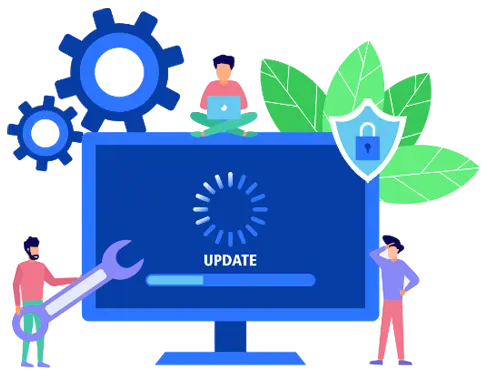Website maintenance refers to the regular process of updating, monitoring, and managing a website to ensure its optimal performance, security, and functionality. It involves various tasks aimed at keeping the website running smoothly and meeting the needs of its users

Key aspects of website maintenance
Website maintenance involves a series of tasks aimed at keeping a website functional, secure, and up-to-date.
Content Updates
Regularly updating website content is essential for keeping information accurate, relevant, and engaging for visitors. This includes adding new content, refreshing existing content, and removing outdated or irrelevant information.
Software Updates
Updating the website's software, including the content management system (CMS), themes, plugins, and other applications, is crucial for addressing security vulnerabilities, improving performance, and adding new features.
Security Monitoring
Regular security monitoring helps identify and mitigate potential security threats, such as malware infections, hacking attempts, and data breaches. Implementing security measures such as firewalls, malware scanners, and SSL certificates can help protect the website from attacks.
Backup and Recovery
Creating regular backups of website files and databases is essential for safeguarding against data loss due to hardware failures, software errors, or security breaches. Having a reliable backup system in place ensures that the website can be restored quickly in case of any issues.
Performance Optimization
Optimizing website performance is crucial for providing a fast and seamless user experience. This includes optimizing images, minifying CSS and JavaScript files, implementing caching mechanisms, and optimizing server configurations.
Mobile Responsiveness
With an increasing number of users accessing websites on mobile devices, ensuring that the website is mobile-friendly is essential. Regularly testing and optimizing the website's responsiveness across different devices and screen sizes can help improve user experience and search engine rankings.
SEO Maintenance
Monitoring and optimizing the website for search engines is essential for improving visibility and driving organic traffic. This includes optimizing meta tags, improving website speed, fixing broken links, and creating high-quality, keyword-rich content.
User Feedback and Testing
Gathering feedback from website visitors and conducting usability testing can provide valuable insights into areas for improvement. Addressing usability issues, fixing bugs, and making user-driven enhancements can help enhance the overall user experience.
Compliance and Legal Updates
Ensuring that the website complies with relevant laws and regulations, such as GDPR, ADA, and CCPA, is essential for protecting user privacy and avoiding legal issues. Regularly reviewing and updating website policies, terms of service, and privacy statements can help maintain compliance.
We are Best website maintenance solutions
Website maintenance is crucial for the smooth functioning and success of any website. It involves a range of tasks aimed at keeping the website updated, secure, and optimized for performance. These tasks include regular content updates to keep information fresh and engaging, software updates to ensure security and compatibility, security monitoring to prevent hacking and malware attacks, backup and disaster recovery to protect against data loss, performance optimization to improve loading times and user experience, SEO maintenance to boost search engine rankings, bug fixes and technical support, user experience enhancements, compliance updates, content management, and domain and hosting management. By staying on top of these maintenance tasks, website owners can ensure that their websites remain effective tools for achieving their business objectives.






